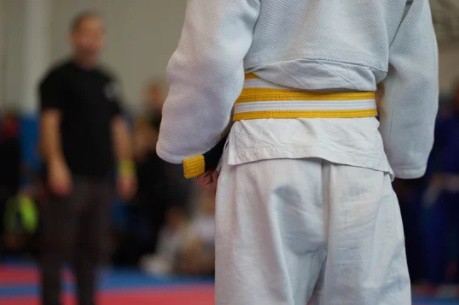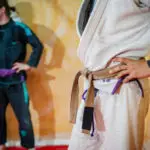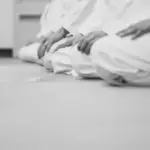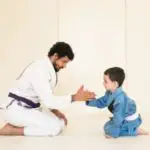Most parents have been faced with children begging and cajoling for something they want really badly. This time it just happens to be a plea to start Brazilian Jiu-Jitsu training, and they’re waiting for your answer… But how do you know when the right time for them to begin is?
Physically, children as young as four can begin to train in Brazilian Jiu-Jitsu. However, starting a child that young can potentially lead to an aversion to the sport, so most practitioners recommend waiting until a child is at least five or six years old or has started first grade.
As an involved parent, you’re probably concerned about your child beginning a contact sport too young. But what is the right age to start training, especially in Brazilian Jiu-Jitsu? Let’s hit the mat together and find out.
Are Children Too Young For Brazilian Jiu-Jitsu?
Brazilian Jiu-Jitsu, or BJJ as it’s commonly known, is a martial art that focuses on grappling and ground fighting. The main idea is to force your opponent into submission by controlling him through certain techniques and holds.
BJJ is nicknamed the “gentle art” because a weaker person often uses it to defend themselves against bigger, stronger opponents. Based on the position that most fights end up on the ground, this form of jiu-jitsu is about getting your opposition to the ground and keeping them there.
You might think that this type of martial art is better left to adults and teenagers. Certainly, BJJ is the kind of sport that, once learned, can be practiced into later adulthood, but it’s not necessary to wait to get started.
The Best Age to Begin Brazilian Jiu-Jitsu Training
Some Brazilian Jiu-Jitsu practitioners would argue that the best time to begin training in the sport is in your past. That is, you should’ve already gotten started. If you haven’t begun yet, the next best time is now.
However, there is a general consensus that children need to reach a certain level of development and maturity before beginning to train in BJJ or any sport for that matter.
Starting too early can backfire and cause a child to develop an aversion to the activity that may last for years.
Before the age of four, most children do not have the necessary coordination and focus to engage in Brazilian Jiu-Jitsu training, even if they have an interest.

So, what is the ideal age to begin training in Brazilian Jiu-Jitsu?
In a BJJ Heroes article, notable psychologist, Hernani Caroço, distinguishes between children learning and training in BJJ versus participating in the competition side of the sport. Caroço suggests that children should be around five or six years old before they begin Brazilian Jiu-Jitsu training and not formally compete before the ages of eight to ten years.
Waiting until your child is five or six or in first grade to begin BJJ training may increase the chance they’ll stick with it and be successful in the sport.
By this age, most children have participated in structured classes at school or church, have developed a bit of self-discipline, and are aware of the importance of following directions and working with other students.
How To Tell If Your Child Is Ready For Brazilian Jiu-Jitsu
Every child is different, maturing faster or slower than his peers. So, it’s up to you as the parent to determine if your child is ready to participate in an organized sport like Brazilian Jiu-Jitsu.
Ask yourself these questions when you’re considering whether or not your child (and you) is ready to enroll in BJJ:
- Are they completely potty-trained?
- Can my child verbally express themselves well enough to make their feelings and needs known to an instructor?
- Do they show an interest in Brazilian Jiu-Jitsu when watching a match or hearing about the sport?
- Is my child coachable? That is, will they listen and follow a coach’s instructions?
- Has my child shown the ability to focus on one thing for more than a few minutes at a time?
- As a parent, am I willing to invest the time in getting my child to practice consistently?
- As a parent, am I willing to be merely an encourager and motivator and not try to live vicariously through my child’s accomplishments?
Should My Child Enroll in Brazilian Jiu-Jitsu?
Brazilian Jiu-Jitsu can give your child skills and confidence to carry with them beyond the childhood years. Plus, besides actual techniques, Brazilian Jiu-Jitsu offers much for your youngster to learn about themselves. Let’s take a look at a few reasons your child should think about training in BJJ.
Healthy Lifestyle Habits
We all know that being active and having friends are key components of a healthy lifestyle. Yet, many children in today’s world spend more time on some type of device than playing outside with friends. They may not socialize or exercise as much as they should.
Brazilian Jiu-Jitsu training gets kids off the couch and challenges them physically and mentally and provides ways to interact with others.
Body Awareness
Let’s face it; kids can be a bit uncoordinated sometimes. Being aware of your own body as it occupies space and moves around in that space is a learned thing.
BJJ training can teach your child how to control their body’s movements, have better spatial awareness, and improve their coordination and balance.
Body Strength
Just the fact that your child is actively engaged in training several hours per week will do wonders for his muscle development and agility. We’re not talking about body-builder strength here, but the healthy, normal development of muscles and joints as they are used regularly.
Self-Confidence
We all gain confidence when we succeed at a mentally or physically challenging task. Brazilian Jiu-Jitsu offers kids the opportunity to take on physical challenges, like an armbar, sweep, or hold. Sticking with something that’s tough brings mental and emotional confidence. It’s such a confidence booster to learn, practice, and then correctly execute what you’ve been taught.
Self-Defense
For most children, self-defense is not the primary reason to train in Brazilian Jiu-Jitsu. In some cases, however, being able to defend yourself is a necessary skill. One of the main tenets of Brazilian Jiu-Jitsu is that physical violence should be used only after all other measures have been taken.
So while BJJ doesn’t encourage aggressiveness, it does teach kids to direct their energy and gives them ways to control an attacker if need be.
What Are Brazilian Jiu-Jitsu Classes Like for Kids?
BJJ classes for kids are not the same as adult classes. They are specifically geared to each age group to make the sport fun, engaging, and challenging.
Depending on the age of the students, class instruction and time may lean more heavily toward games with a few techniques taught. In older classes, children will begin to spend more time on technique and sparring.
Some typical age divisions in BJJ are:
- Ages 5-7: Usually 30-minute classes with games and creative activities centered around BJJ.
- Ages 8-12: 45-60 minute classes are typical; competition is often begun at this level
- Ages 13-16: Somewhere between kids and adults, classes vary and focus on the specific needs of this age group
- Ages 17 and up: Train as adults
Final Thoughts
Allowing your child to participate in a contact sport such as Brazilian Jiu-Jitsu is a big decision for many parents. Too early, and the child may be turned off. Too late—well, it’s really never too late to start.
The bottom line is this: your child should start Brazilian Jiu-Jitsu when they are ready for the challenge, preferably after the age of five or six once they’ve started in first grade.



1 thought on “When Should Your Child Begin Training In Brazilian Jiu-Jitsu?”
Comments are closed.